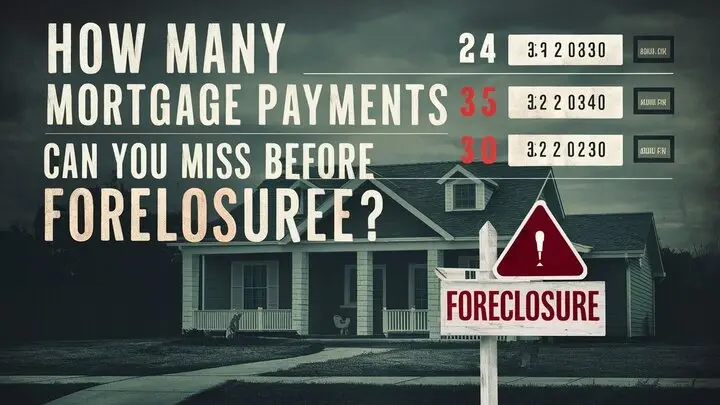
The number of missed payments that can be made without leading to the foreclosure of a home depends on many factors.
This means that, if you fail to pay your mortgage it will one day be confiscated by the bank or the building society. However, how many months can a person afford to miss their payments without the bank taking the step of repossessing the house? The following text will describe the sequence of events that typically follow failure to make a mortgage payment and end up with foreclosure.
The foreclosure process begins once the first payment is missed How Long Does Foreclosure Take?
The exact number of mortgage payments you can miss before foreclosure varies by state and mortgage lender, but the typical foreclosure timeline goes something like this:
1 Missed Payment
Your lender will notify you through a mailed or emailed notice that one of your payments was missed. As of now, no severe measure will be taken if you pay the due amount immediately plus some specific charges for a delay in payment all through this period.
2 Missed Payments
In the first case, if two consecutive payments were not made, the lender sends a letter stating that the foreclosure of the property might occur if the payments are not made further. Lenders should be approached after you have missed two payments for a discussion on what can be done.
3. 90 Days Delinquent
The mortgage payment is considered 90 days past due or three months delinquent within a continuous period of three months. At this stage, the lender will write to you asking you the amount which you should have to pay to avoid foreclosure.
4. 120+ Days Delinquent
Payments missed for four months bring your mortgage to 120 days past due, and the risk of foreclosure rises significantly. At this point, the lender usually puts out a public notice of default. You can get an opportunity to regain your loan and avoid foreclosure by having to pay all that was borrowed.
5. Past Due – 6 MONTHS TO 1 YEAR
If the payments remain unpaid, the bank will fix a date for the foreclosure sale and notify you of the same within about 6 months to 1 year of the first missed payment. If you fail to pay the amount owed in the mortgage, your home will be sold at an auction within one to two months after the foreclosure sale notice is issued.
6. The Total Timeline
Therefore, from first becoming delinquent and missing a mortgage payment, most homeowners are likely to be in foreclosure for about 6 months to one year before the property is sold at a foreclosure auction. But it is important to act before reaching this state of, for example, being evicted because of a foreclosure. The more you will be able to do to avoid it if only you could get to your lender or consider the circumstances at your disposal after the missed payments earlier.
Factors That Determine Timeline
While most lenders follow similar timelines, the exact number of missed mortgage payments before foreclosure can depend on:
• State Foreclosure Laws: Processing periods can also differ from one state to another depending on the laws governing foreclosure. For instance, New York has set the waiting period for lenders to 14 months instead of the 6-12 months recommended.
• Type of Mortgage: The time it takes may vary on the type of loan you have: FHA, VA, USDA, or conventional.
• Lender Policies: Some lenders are quicker compared to others when it comes to time for payment. The large banks tend to have longer time lags at the onset of this process and its completion.
• Loan Status: For people with FHA, VA, or USDA loans, when they have made some previously missed payments, their lender can foreclose on the home earlier than the above time frame.
• Hardship Options: Sometimes if the lender provides a kind of mercy such as a forbearance, then it can postpone the commencement of the legal action in the form of foreclosure.
Measures to Take When One Fails to Make the Payment on a Loan When it Is Due
To give yourself the best chance at avoiding foreclosure, be sure to:
You should immediately call your lender once you are unable to make further payments on your mortgage. Perhaps the problem was merely due to sheer carelessness or confusion on the part of the worker involved. If you are from a large company, ensure that there is no way the payments are being redirected or delayed from your side. But these issues still occur more frequently than one would imagine. However, even if the nonpayment is because of hardship – the best thing you can do is to contact your lender as early as possible to explore all the ways to avoid foreclosure in the future. Waiting seldom does good.
Ask about hardship options. Almost every lender in today’s market has provided loan modification plans to offer those homeowners in distress. Common options include:
• Temporary restructuring of loan - Your lender either halts or reduces your mortgage payments for a short period, which is typically between three and twelve months. After the forbearance period, you must pay what was not paid or make arrangements for it to be paid for you.
• Loan modification – This is a realignment of the original loan terms under which your lender offers more flexible payment terms that suit your current financial status. It might even lead to a long-term cut in monthly payments.
• Partial claims – An interest-free loan that allows you to pay only part of the owed amount in back payments. This amount is paid back in the future once one sells the home or when they are paying off the refinancing of a mortgage.
Sign up for consumer protections as far as possible. The CFPB rules in mortgage servicing also state that the account cannot be placed in foreclosure before it is delinquent for 120 days. This forced time frame helps to slow down the foreclosure process and provides homeowners an opportunity to seek help.
Sell your home yourself. This is especially so if there is little or no equity in the home to begin with, it is preferable to get less than full market value on the short sale, with the approval of the lender than lose the home to a foreclosure sale whereby the home gets sold cheaper than on a short sale. In any market, a short sale helps credit repair rather than foreclosure if you are in a short sale.
The loss of homes through foreclosure is very expensive in terms of dollars and sense, and the emotional toll as well. But at least if you are dealing with the lender directly, walking through them all with the end view of averting foreclosure, you can avoid it most of the time even if you have missed several payments. Do not allow yourselves to be stuck in a home that costs you lots of cash on mortgage repayments!



